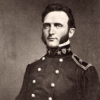Stonewall Jackson

Stonewall Jackson
Thomas Jonathan "Stonewall" Jacksonwas a Confederate general during the American Civil War, and the best-known Confederate commander after General Robert E. Lee. His military career includes the Valley Campaign of 1862 and his service as a corps commander in the Army of Northern Virginia, under Robert E. Lee. Confederate pickets accidentally shot him at the Battle of Chancellorsville on May 2, 1863. The general survived but lost an arm to amputation; he died of complications from pneumonia eight days later...
NationalityAmerican
ProfessionSoldier
Date of Birth21 January 1824
CountryUnited States of America
In the Army of the Shenandoah, you were the First Brigade! In the Army of the Potomac you were the First Brigade! In the Second Corps of this Army, you are the First Brigade! You are the First Brigade in the affections of your general, and I hope by your future deeds and bearing you will be handed down the posterity as the First Brigade in this our Second War of Independence. Farewell!
I want my army to be an army of the living God.
War means fighting. The business of the soldier is to fight. ... To move swiftly, strike vigorously, and secure all the fruits of victory is the secret of successful war.
Duty is ours; the consequences are the Lord God's
Died of wounds inflicted in error by his own troops at the battle of Chancellorsville during the US Civil War. Let us cross over the river and sit in the shade of the trees.
Through life let your principal object be the discharge of duty.
Always mystify, mislead, and surprise the enemy, if possible; and when you strike and overcome him, never let up in the pursuit so long as your men have strength to follow; for an army routed, if hotly pursued, becomes panic-stricken, and can then be destroyed by half their number. The other rule is, never fight against heavy odds, if by any possible maneuvering you can hurl your own force on only a part, and that the weakest part, of your enemy and crush it. Such tactics will win every time, and a small army may thus destroy a large one in detail, and repeated victory will make it invincible.
The only winner today is big business.
War means fighting. The business of the soldier is to fight. Armies are not called out to dig trenches, to throw up breastworks, to live in camps, but to find the enemy and strike him; to invade his country, and do him all possible damage in the shortest possible time. This will involve great destruction of life and property while it lasts; but such a war will of necessity be of brief continuance, and so would be an economy of life and property in the end.
Do your duty and leave the rest to Providence.
You may be whatever you resolve to be.
Don't say it's impossible! Turn your command over to the next officer. If he can't do it, I'll find someone who can, even if I have to take him from the ranks!
There are but few commanders who properly appreciate the value of celerity.
People who are anxious to bring on war don't know what they are bargaining for; they don't see all the horrors that must accompany such an event.